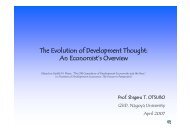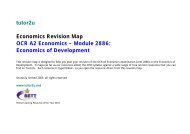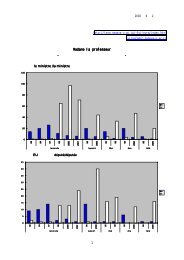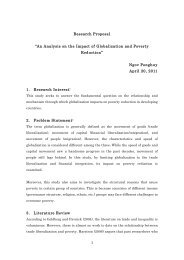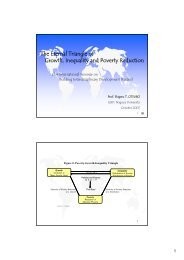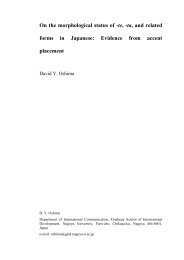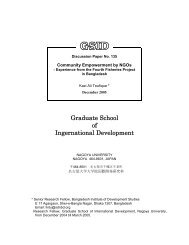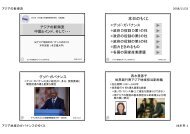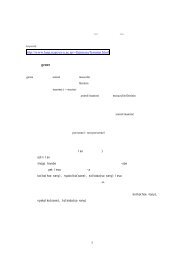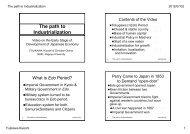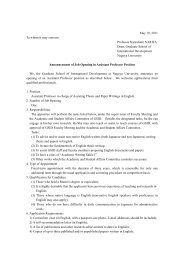Report
Report
Report
You also want an ePaper? Increase the reach of your titles
YUMPU automatically turns print PDFs into web optimized ePapers that Google loves.
H IGHER EDUCATION SERVICES 137<br />
arrangements of the articulation model. The instances<br />
of providers starting off-campus centres/campuses are<br />
very few. The articulation model provides an example<br />
of transition from total import to cooperative ventures.<br />
The programmes offered by the foreign providers have<br />
found ready acceptance in India. However, considering<br />
the total student population the enrollment in the<br />
academic programmes offered by the foreign universities<br />
is insignificant. Powar suggests that since the early<br />
1990s there has been a steady increase in the number<br />
of foreign providers in the developing countries of Asia<br />
(Powar 2007). However, Powar argues, by and large,<br />
the best universities are not represented. Many of the<br />
providers are not even accredited as universities in their<br />
own countries. A recent development is the steep increase<br />
in the number of articulation arrangements, as many<br />
as 61 such agreements were recorded. Significantly, the<br />
Indian partners are private institutions, some like the<br />
Manipal academy of higher education, having a<br />
reputation of being providers of quality education.<br />
Some reputed private university-level institutions<br />
(deemed universities) in India have ventured abroad<br />
and set up campuses in countries having a significant<br />
Indian diaspora. Examples are the Birla institute of<br />
technology and science in Dubai, Birla institute of<br />
technology, Ranchi in Oman and the Manipal academy<br />
of higher education and Medical Group in Nepal and<br />
Malaysia. By all accounts these ventures are successful.<br />
Movement of teachers and scholars from the<br />
developed world to the Asian countries is at a low level<br />
(Mode 4). This is because scholars from developed<br />
countries are not willing to go to developing countries<br />
for extended periods. However, an appreciable number<br />
of Asians take up teaching or research assignments in<br />
the developed countries. Although the chances of there<br />
being an appreciable increase in teacher mobility, for<br />
extended periods of services have been considered as<br />
remote, at regional level there is a need for movement<br />
of teachers and it should be facilitated as much as<br />
possible.<br />
The study by Powar suggests that the all India<br />
council for technical education (AICTE), which overseas<br />
engineering and management education in India,<br />
has issued regulations to control the entry and operation<br />
of foreign universities/institutions for imparting<br />
technical education. The AICTE regulations require the<br />
foreign provider to either establish operation on its own<br />
or have collaborative arrangements with a recognised<br />
Indian academic institution. The foreign institution<br />
should be accredited in its home country and should<br />
give an undertaking that the degree/diploma will be<br />
recognised in the home country. The Indian partner<br />
has to be an Indian university or an affiliated institution,<br />
preferably accredited by the national board of<br />
accreditation of AICTE. The nomenclature of the<br />
degree offered in India has to be the same, as that exists<br />
in the home country. However, Powar argues, it is not<br />
clear as to what would be the interpretation if the<br />
nomenclature were not in accordance with the<br />
nomenclature approved by the university grants<br />
commission. It will be the responsibility of the<br />
concerned foreign university/institution to provide for,<br />
and ensure that, all facilities are available. The fees<br />
charged, and the intake of students, will be prescribed<br />
by the AICTE. There are other conditions that aim at<br />
protecting the interests of Indian students and provide<br />
for overall control of operations by AICTE.<br />
The AICTE regulations are omnibus in nature and<br />
are applicable to foreign universities intending both to<br />
enter into collaborative arrangements with Indian<br />
academic institutions, and to establish their own<br />
campus. However, Powar argues that it is doubtful if<br />
these could be applied, with equal effectiveness, to the<br />
different modes of operations like agreements leading<br />
to joint or dual degrees, articulation programmes, franchise<br />
arrangements or direct operation through (offshore)<br />
centres/campuses. It would, perhaps, be better<br />
to have separate regulations for different situations.<br />
The national policy on education 1986 recognised<br />
the need to monitor and promote the quality of education<br />
through a process of assessment and accreditation.<br />
Accordingly, four major accreditation agencies were set<br />
up. These are;<br />
• The national assessment and accreditation council<br />
(NAAC) under the UGC, which undertakes evaluation<br />
of all types of higher education institutions.<br />
• The national board of accreditation (NBA) under<br />
the AICTE, which undertakes programme evaluation<br />
in the disciplines of engineering and technology,<br />
management and pharmacy.<br />
• The accreditation board (AB) of the Indian council<br />
for agricultural research (ICAR), which monitors<br />
the compliance with norms and standards set for<br />
agricultural education in India.<br />
• The distance education council (DEC) under the<br />
IGNOU, which evaluates and accredits institutions<br />
offering distance education programmes.<br />
The UGC, the AICTE and other statutory Councils<br />
like the National council for teacher education, medical<br />
council of India, council of architecture, and bar council




